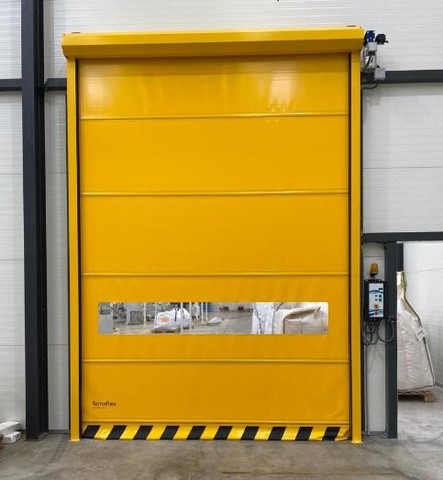Industry
Complete guide to industrial doors: types, benefits and applications

One of the main issues many companies are facing today is how to optimize processes in their industrial buildings while, at the same time, ensuring the operational efficiency of workers and machines.
One of the key aspects in this context is industrial doors, which play a fundamental role not only in optimizing processes, but also in ensuring that there is safety in the workplace, optimizing time and resources, controlling temperature levels, etc.
That is why we have prepared this complete guide on which industrial door to choose depending on the needs of your company. We will explore the different types of industrial doors, their benefits and the applications of each of them in different industrial environments.
Benefits of industrial doors
Industrial doors provide a number of benefits that make them indispensable in any industrial facility. Among the main advantages are
- Access security: Industrial doors are designed to offer a high level of security, while protecting both personnel and facilities. In addition, it prevents possible access by people outside the company.
- Temperature control: With the ability to maintain environments at specific temperatures, industrial doors contribute to climate control in critical spaces such as warehouses for sensitive products. This will be of vital importance in companies in the food sector, for example, where temperature changes are very sensitive.
- Space saving: The doors can be moved horizontally or vertically, which makes it possible to make the most of the space available in the facilities, as they will remain attached to the wall or ceiling, allowing the space that a normal door would occupy to be used.
- Efficient loading and unloading: Industrial doors facilitate the flow of goods by providing quick and safe access for loading and unloading products.
- Thermal insulation: Essential in environments where a constant temperature must be maintained, industrial doors with thermal insulation properties contribute to energy savings and process performance.
- Flexibility: Adaptability to different needs and environments, allowing the integration of automation and control systems for more efficient management.
- Logistics performance: By facilitating the flow of materials and products, industrial doors contribute directly to improving the operational efficiency and logistics performance of a facility.
Types of industrial doors
There are several types of industrial doors, each designed to meet specific needs based on the environment and operating requirements. Some of the most common types include:
- Roll-up doors: Ideal for environments where fast and frequent access is required, such as warehouses and production areas.
- Fold-up doors: Offer fast and efficient access, with the ability to stack vertically to optimize space when open.
- Car parks high-speed door: Designed especially for use in industrial parking lots, they provide security and access control.
- Self-repairing high-speed doors: Strong and durable, this type of door minimizes downtime by automatically repairing itself in the event of an impact.
- Sectional doors: With vertically sliding panels, these doors are ideal for maximizing space both inside and outside industrial facilities.
Applications and solutions for industry
Industrial doors find applications in a wide variety of industries and sectors. From the food sector with preservation chambers to the automotive industry with production areas, industrial doors offer solutions adapted to the specific needs of each environment.
- High-speed door for cold-storage chambers up to -30: Industrial doors with thermal insulation properties are essential in cold storage chambers to maintain a constant temperature and ensure the quality of stored products.
- Production environments: In industrial environments where manufacturing processes take place, fast and secure doors are essential to ensure an efficient and safe workflow.
- Logistics facilities: In warehouses and distribution centers, industrial doors facilitate the flow of goods and contribute to logistics performance by minimizing waiting times and optimizing loading and unloading processes.
Best door for every situation
Choosing the right industrial door depends on a number of factors, including the type of industry, the operating environment and the specific requirements of each application.When considering safety, efficiency and performance needs, it is important to select the door that is best suited to each particular situation.
For this reason, we recommend a consultation with our experts in order to determine the ideal solution for your industrial buildings. Contact Ferroflex team.
